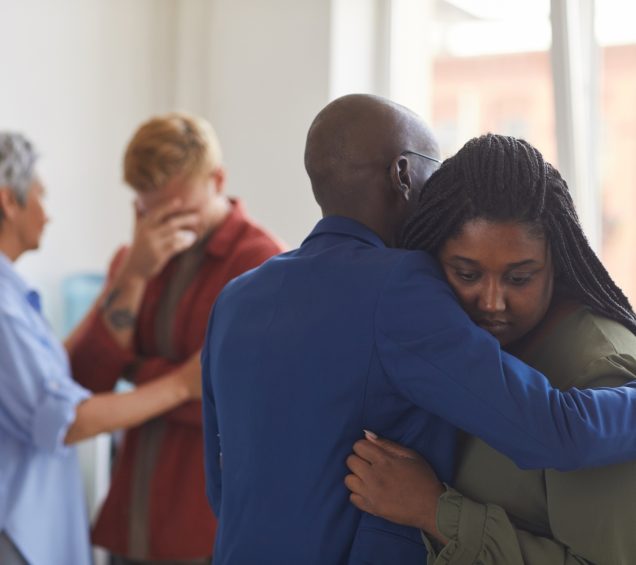Enabling and Codependency: Insights from Caron Centers
Trying to provide support for a friend, family member, or another loved one who may be in active recovery treatment or needs to be engaged in the recovery process is a difficult undertaking. It’s important to establish early on which of our actions is helping those move toward recovery and which are leaving them stagnant.
The central distinction between enabling and providing progressive support is the consequence. When we enable, we inadvertently prevent our loved ones from taking accountability for the consequence of their actions. Ultimately, we assume responsibility for the actions of others and stagnate the process of their recovery or even seeking out and/or be willing to go to treatment. When we provide support, we are helping to ensure that our loved ones are on a safe path to recovery which acknowledges the problematic nature of their behavior.
The Impacts of Enabling and Codependency
Enabling and codependency play intricate and significant roles in the realm of drug and alcohol dependency treatment, exerting profound impacts on both individuals struggling with dependence and their support networks. Enabling, often stemming from well-intentioned concern, inadvertently fosters an environment that perpetuates dependent behaviors by shielding individuals from the consequences of their actions. This misguided assistance can hinder the individuals' motivation to seek genuine recovery, ultimately prolonging the cycle of dependency. In parallel, codependency, characterized by excessive emotional reliance on the individual, not only strains relationships but also obstructs the healing process. Caregivers or loved ones may inadvertently prioritize the individuals needs above their own, neglecting self-care and enabling a dynamic where both parties remain trapped in destructive patterns. A balanced and informed approach to addiction treatment necessitates addressing and rectifying these enabling and codependent dynamics, as they are pivotal factors that can either impede or catalyze the path to lasting recovery and well-being.
Recognizing Enabling Behaviors
It is important to stress the matter of consequence. When we accept the responsibilities of those who are struggling with addiction and need to achieve recovery, we are halting their progress.
This acceptance could be:
-
Financial: taking over bills, debts, rent, or any other expense for a loved one in recovery
-
Simply behavioral: making excuses for a friend in personal or professional life
Other enabling behaviors may include:
-
Justifying or rationalizing their behavior
-
Avoiding conflict in the name of “keeping peace”
-
Being in denial of the problems of a loved one
-
Even turning to anger or pleas to stop an alcohol-related behavior can be enabling, in that it allows those to think that a brief scolding is the only material consequence of their actions
Being able to recognize these behaviors in action is key to gain an understanding of what will help or harm our loved ones on the path toward recovery.
From Enabling to Support
Now that we can aptly recognize the distinctions between enabling and supportive behaviors, it’s imperative to focus on what we can do to help. Before providing support, learn as much as possible about your loved one’s substance use disorder so that you feel prepared to offer the appropriate kind of help.
A good first step in providing support is to establish clear boundaries and make sure they are not crossed. Upholding boundaries is key to making sure a loved one is held responsible for their actions. However, it is important not to shame or berate loved ones in their treatment program, nor to ignore them completely.
Be sure they have access to the necessary resources they need for recovery, whether that be immediate medical support or access to a support group
Approach them with empathy and compassion.
Ask them for concrete commitments towards recovery and follow up to be sure that they complete them.
Remain invested in their journey and be available to listen when they ask for help.
Find a Treatment Program to Support Drug and Alcohol Recovery
Helping a friend or loved one on the path to recovery from alcohol dependence is a difficult but necessary process. Along the way, it’s imperative to be sure your behavior is not enabling their problems but helping them along the way on the path to recovery and empowering them to use the tools and techniques they have learned during treatment to establish/grow healthy behaviors. Caron offers a wide range of support services to help at all stages along the path to recovery, from hands-on treatment programs with inpatient and outpatient options as well as a variety of support groups and platforms for those in recovery and their friends and families. Contact us today to learn more.
Continue Learning About Enabling and Codependency
Take the next step:
Start with an online form
-
Caron in Pennsylvania
1-800-854-6023 -
Caron in Florida
1-800-221-6500 -
Breakthrough at Caron
1-800-213-7834




